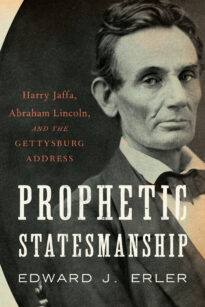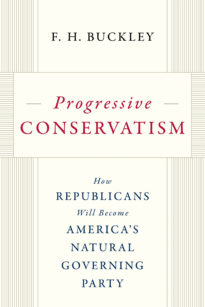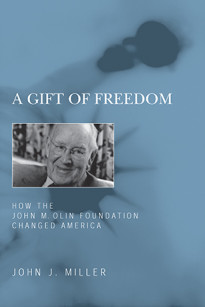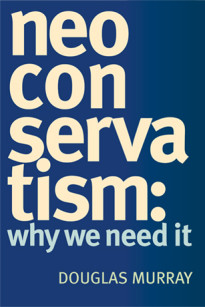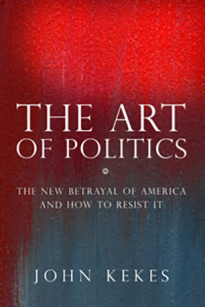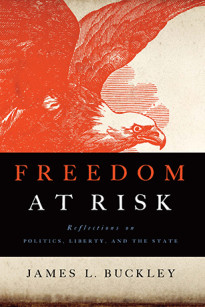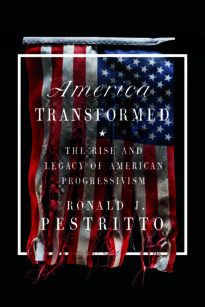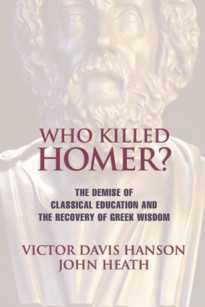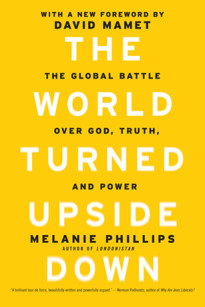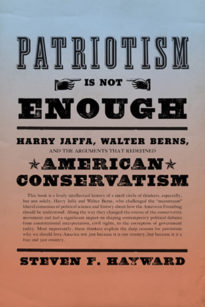This book is a lively intellectual history of a small circle of thinkers, especially, but not solely, Harry Jaffa and Walter Berns, who challenged the “mainstream” liberal consensus of political science and history about how the American Founding should be understood. Along the way they changed the course of the conservative movement and had a significant impact on shaping contemporary political debates from constitutional interpretation, civil rights, to the corruption of government today. Most importantly, these thinkers explain the deep reasons for patriotism—why we should love America not just because it is our country, but because it is a free and just country.
Free shipping on all orders over $40
Patriotism Is Not Enough
Harry Jaffa, Walter Berns, and the Arguments that Redefined American Conservatism
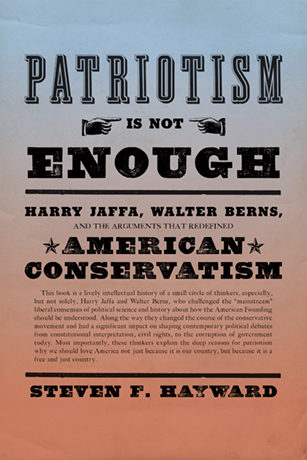
Also Purchase as e-Book
Publication Details
Hardcover / 304 pages
ISBN: 9781594038839
AVAILABLE: 2/14/2017
- Media: Request a Review Copy
- Academia: Request an Exam Copy
About the Author
Steven F. Hayward is a resident scholar at UC Berkeley’s Institute of Governmental Studies and a visiting lecturer at Berkeley Law.
Praise
Excerpt
“Is Walter Berns still alive?”
“Yes. He’s 95 and in poor health, but I think Walter and Harry [age 96] are seeing who can outlive the other as the last act in their long-running feud.”
I offered that whimsical speculation the week after Christmas in 2014 at a meeting at the Claremont Institute. About two weeks later, on Saturday, January 10, the Weekly Standard magazine was the first to publish on its website the sad news that Berns had passed away that morning. Jaffa, also in failing health, had gone to the hospital the day before. He was slipping in and out of consciousness, but intermittently awake enough to make the standard complaints about the usual defects of hospital life. His family and visiting students were guardedly optimistic; he had overcome several acute crises and hospitalizations before. But he took a turn for the worse, and when he passed away a few hours later, the comparison to Thomas Jefferson and John Adams passing on the same day in 1826 became inescapable.
Jefferson and Adams had been bitter political rivals, culminating in the close and initially inconclusive election of 1800 that could easily have ended in the ruin of the still infant nation. Abraham Lincoln taught, as Jaffa never tired of reminding students, that the election of 1800 was the first to prove that ballots could replace bullets as the means of changing a government.
Adams and Jefferson reconciled in later years, chiefly because the two giants of the American Founding shared the same basic political philosophy, which slowly dissolved the rancor of personal ambition and party spirit that dominated their poor relations for the better part of a decade. Some of their political and constitutional disputes had deep theoretical roots, turning on subtle shadings of how republican concepts should be understood and practiced. Jefferson had some radical inclinations at times, like that “God forbid we should ever be 20 years without such a rebellion” musing he once made in a private letter, while Adams was the prototypical cautious conservative. Arguing politely and respectfully over their differences in a long correspondence became one of their favorite pastimes in retirement.
Jaffa and Berns never contested each other for political office, but their arguments over the course of a decade took on the bitterness and personal invective of partisan strife. “In your present state of mind,” Jaffa wrote in one public letter to Berns, “nothing less than a metaphysical two-by-four across the frontal bone would capture your attention.” One of Berns’s retorts began: “Who will rid us of this pest of a priest?” Unlike Jefferson and Adams, they never reconciled their intellectual differences, although the feud gradually burned itself out, and the two old giants did once sit together and talk cordially, if a bit stifly, over lunch in Washington, a meal carefully brokered by the Claremont Institute around 2005. It wasn’t necessary to confiscate the forks and knives. By then Jaffa had turned his attention to new feuds with other targets, and Berns was happy to pass the bull’s-eye on his back to Allan Bloom, Robert Bork, Chief Justice William Rehnquist, and Justice Antonin Scalia.
Epic academic feuds are common, but are often about trivial or obscure matters. It is a mistake to explain the Jaffa-Berns quarrel as an example of the narcissism of small differences, or still less the simple pride or one-upmanship typical of most academic fights that have little consequence in the real world. But the differences between Jaffa and Berns and their allied camps that seem abstract or remote on the surface are connected to a serious question, perhaps the most serious political question of this or any time: What kind of country is America? What is the right or best basis for patriotism? Is democracy capable of being understood and conducted nobly? Above all, can these questions be answered without recourse to pondering deeply the nature and condition of the human soul?

